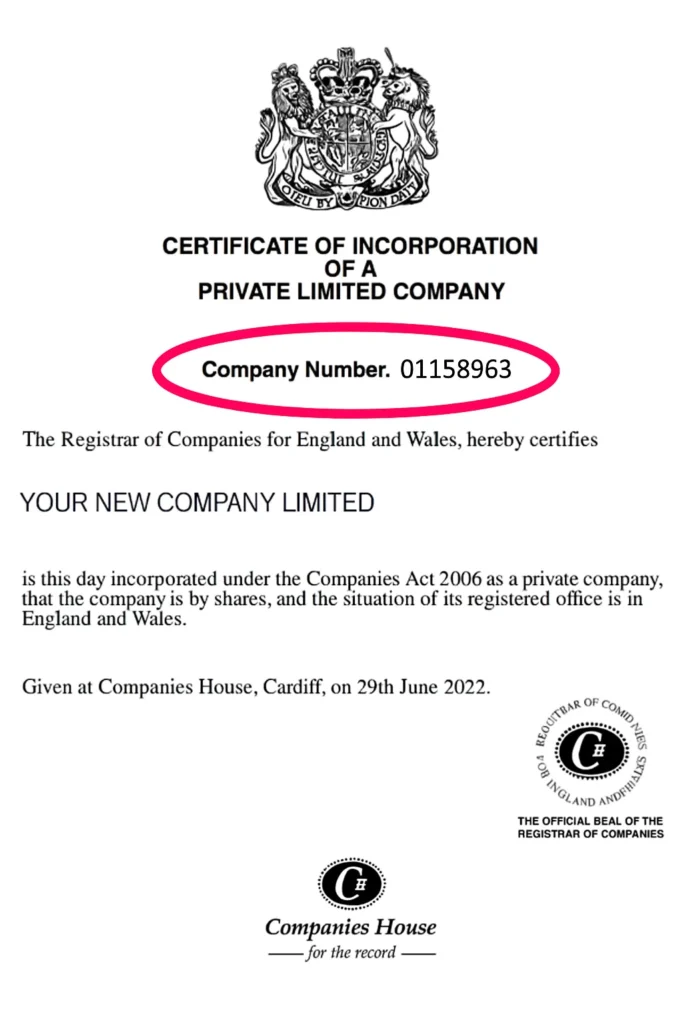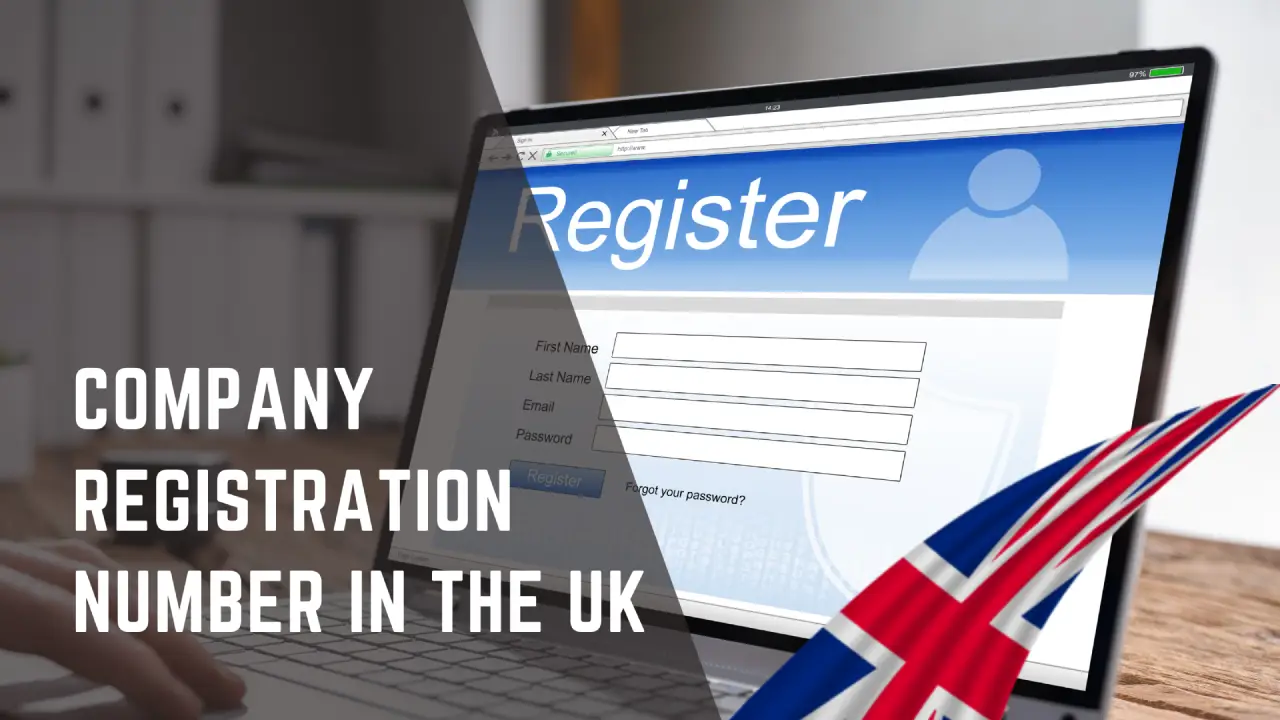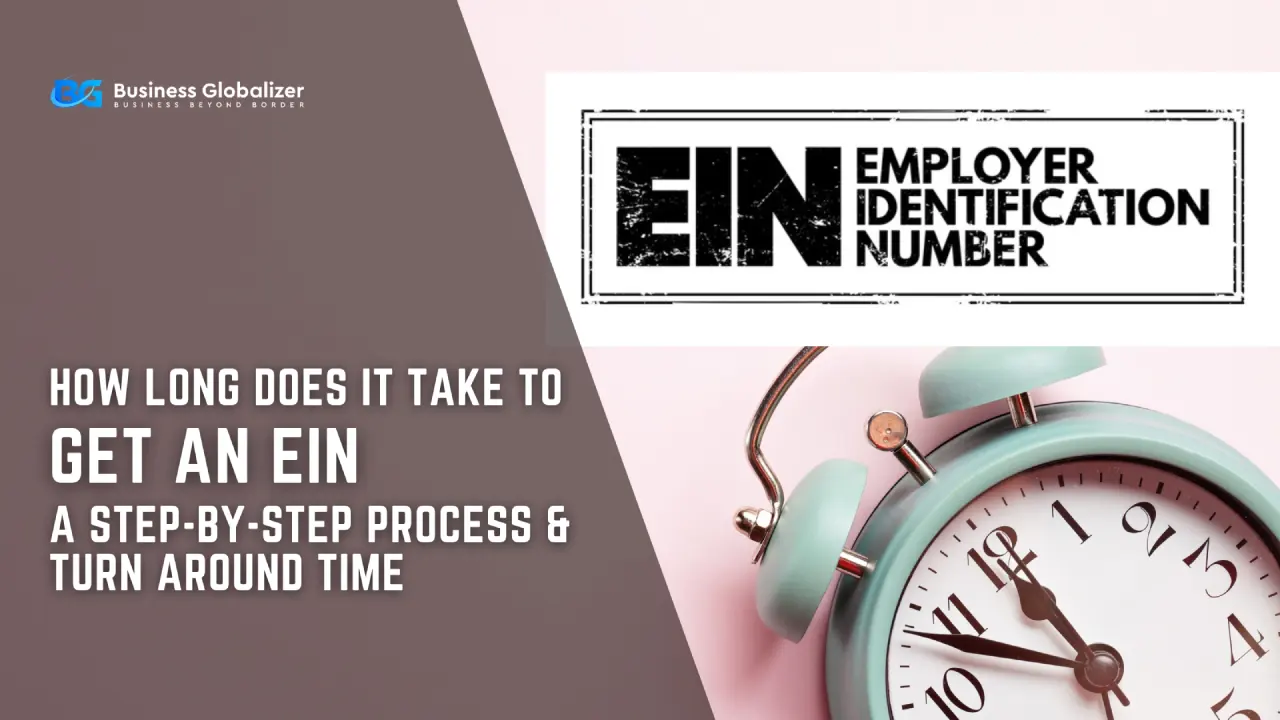Starting a business in the UK without knowing the company registration number is like building a house without a foundation. The foundation is vital for a house to stand firm and secure. Similarly, a CRN is essential to operating legally and conducting business with other businesses.
In this blog, we will explain why a company registration number in the UK is required and how it fits into the legal context of a business.
What Is a Company Registration Number (CRN)?

A CRN is like a passport for a business. The word “CRN” stands for Company Registration Number. This is also known as the “Companies House Number” or “CH number.”
If you are doing business or planning to do business in the UK, you must learn about the Company Registration Number (CRN). A CRN is a unique eight-digit code consisting of two letters followed by six numbers.
For example, Scottish limited companies’ registered numbers start with “SC” followed by six numbers, such as “SC123456”. The first two letters indicate the country (GB, which means Great Britain) and the type of company (e.g., LTD for limited company). The remaining six numbers are unique to each company.
However, in some cases, the remaining six could be eight. This is because Companies House started using eight-digit CRNs in 2016. Companies that were incorporated before 2016 will still have 9-digit CRNs.
CRNs are not case-sensitive and are unique to each company. They are required for various purposes, such as opening a bank account, registering for VAT, and applying for government grants. You can find a company’s CRN by searching for it on the Companies House website.
The UK’s register of companies, Companies House, issues this number to incorporated businesses. Government records and official documents use this to identify a company. Businesses can also use this number to identify other businesses.
Who Needs a Company Registration Number?
Now that you know a company registration number, you may wonder who needs to use it. Like other corporate registries, the UK has its own version of a company registration number. The company registration number is a unique identifier for the registered business entity and is used for various official and legal purposes, as mentioned below:
- LLPs and Limited Companies: A company registration number is required only if you start an incorporated business in the UK as a limited company or limited liability partnership (LLP). Unincorporated businesses like sole traders or freelancers, partnerships, limited partnerships, or trusts don’t need a company registration number (CRN).
- Foreign Companies: Foreign companies that want to form a subsidiary, branch, or place of business in the UK must register a company registration number (CRN).
- Companies House: The UK’s register of companies, Companies House uses CRN for web filing to identify your business or company. When businesses file a document using WebFiling, they must enter their CRN and other identifying information, such as their company name and address. Companies House will then use this information to verify your identity and link your filing to your company’s record. Here are some of the documents that you can file using WebFiling:
- Annual accounts.
- Confirmation statements.
- Changes of company name, address, directors, or secretaries.
- Charge documents.
- Notices of appointment or removal of liquidators.
- Winding-up petitions.
- Unlimited Companies: Unlimited companies are less common in the UK because they carry more risk for their members. But they can also be registered entities in the UK and need a CRN.
Why Do You Need a Company Registration Number?
We understand what you are thinking now. You’re probably wondering, “Do I need a company registration number?
You will need a company registration number if you form a limited company, a limited liability partnership, or plan to form any subsidiary companies as foreign companies. Here are the key reasons you might need a company registration number in the UK:
- Legal Recognition: You might need a company registration number to get legal recognition for the identity of your business as a non-resident. It distinguishes your business from others and allows legal and regulatory entities to identify your company in official records. Failing to have a CRN for your company can result in legal consequences and penalties.
- Business Activities: A CRN is often required if you plan to conduct business activities in the UK. It ensures you comply with UK regulations and can engage in legitimate commercial activities.
- Banking and Financial Transactions: To open a business bank account in the UK, you typically need a CRN. It’s also necessary to conduct various financial transactions and interact with financial institutions.
- Contracts and Agreements: Many business contracts and agreements may require you to provide your CRN for verification and legal purposes. This includes agreements with suppliers, clients, landlords, and other parties.
- Intellectual Property Protection: If your business involves intellectual property like trademarks or patents, having a UK CRN can help protect your intellectual property rights within the UK jurisdiction.
- Access to Funding and Investment: Having a registered company with a CRN can make it easier to attract investors, access funding, and apply for grants or loans from UK-based sources.
- Legal Proceedings: In the case of legal disputes or court proceedings involving your company, the CRN can be used to identify the legal entity involved accurately. Your CRN is included in various legal documents, such as contracts, agreements, and official correspondence.
- Taxation: Tax authorities use your CRN to identify your business for tax purposes. It’s crucial for filing tax returns, claiming deductions, and paying taxes accurately. Your CRN is also required to register for corporation tax.
- Statutory Filings: As a registered company, you must submit various statutory filings to Companies House. These filings include annual financial statements, company structure or ownership changes, and more. The CRN is used to track and reference these filings. You’ll need to provide your CRN to ensure accurate identification of your company.
- Limited Liability Protection: If your business is organized as a limited company, the CRN is linked to the company’s limited liability status. This means that the owner’s personal assets are generally protected from the company’s debts and liabilities beyond their investment in the business.
- Exit Strategies: If you plan to exit or sell your business in the future, having a registered company with a CRN provides a structured framework for ownership transfer.
Lastly, if you’re starting a business in the UK, obtaining a CRN is one of the foundational steps to establishing your business entity.
What Is the Format of a Company Registration Number?
CRNs are always eight characters in length (at the present). The format of your company registration number will vary depending on your company’s business structure and the legal jurisdictions in which you are incorporated. The CRN will typically fall into one of the following formats:
- Eight digits (e.g. 12345678).
- Or, two letters followed by six digits (e.g.AB123456).
For instance, in England and Wales, CRN is eight characters long and takes the form of two letters followed by six numbers (e.g., OC123456) for limited liability partnerships (LLPs).
How Can You Get a Company Registration Number?
At this point, you might try to learn about getting a company registration number. Only incorporated businesses registered with Companies House can obtain a company registration number (CRN).
This is entirely computer-generated. You can’t change or choose this. But as a non-resident, you must follow the same steps as a resident to get a company registration number for your incorporated business in the UK. However, there are a few extra requirements:
- Please provide a UK address for your registered office.
- Appoint at least one director and one shareholder and provide their names.
- Decide on the amount of share capital your company will have.
- Complete the INC1 form to register by post.
- You may need to provide the necessary documents, including a certified copy of your passport and proof of registered office.
- Lastly, pay the registration fee.
- And submit the form to Companies House.
We recommend that you talk to any business legal expert or service with adequate knowledge and years of experience in the UK. You can get help from Business Globalizer. We can provide you with a registered office address in the basic package in the UK for one year. We handle all the paperwork and send official documents to your business.
What to Remember About Registering a CRN?
If you intend to do business in the UK, you must obtain a CRN. This certification confirms that your company has registered with Companies House, proving its authenticity. Remembering specific details of your Company Registration Number when registering and managing your company in the United Kingdom is crucial. Here’s what you should remember:
- Clear and Easy to Find: Your registration number doesn’t need to appear on every page of a website or document, but it must be noticeable and easy to find. If you fail to include it or if you do not make it clear, you are taking the risk of being fined.
- Permanent and Unchanging: The CRN remains the same throughout the lifespan of your company, regardless of any change to the company’s name, structure, directors, or other details.
- Used in Legal Documents: Your CRN will be used in various legal and official documents related to your company, including incorporation certificates, filings, and correspondence with government agencies.
- No Similarity with UTR or VAT Number: The CRN is distinct from other identifiers, such as the Unique Taxpayer Reference (UTR) and Value Added Tax (VAT) registration numbers.
- Record Maintenance: Keeping records of your CRN and other company documentation is essential. This can be used for future reference and compliance purposes.
- Update Companies House: If you change your registered office address or other important company information, remember to update the information with Companies House to ensure accuracy in their records as a company number search.
- Beware of Scams: Be cautious if you receive unsolicited communications that request your CRN or other sensitive company information. Verify the authenticity of such requests before sharing any information.
What Happens If You Lose Your Company Registration Number?
Doing business in the UK means having several different codes and registration numbers. So, it’s normal to forget or lose your CRN or mix it up with another number. But don’t give yourself a headache! You can find this in different places related to your company.
Where Can You Find Your Company Registration Number?
We understand that, at this point, you are looking for the answer to this question: “Where can I find my company registration number (CRN)?”
As we mentioned above, your Company Registration Number (CRN) can be found on various official documents and communications related to your registered company in the UK, such as:
- Certificate of Incorporation: When registering your limited company or limited liability partnership with Companies House, you must get a Certificate of Incorporation. This certificate will prominently display your company’s CRN.
- Companies House Correspondence: If you’ve received any official correspondence from Companies House in the past, your CRN might be mentioned in those letters or documents.
- Annual Confirmation Statement: If you’ve filed an Annual Confirmation Statement (formerly Annual Return), your CRN will be listed on that document. You can request a copy of this statement from Companies House Register.
- Bank Records: If you’ve opened a business bank account, your CRN might be mentioned in your account-related documents or correspondence with the bank.
- Accountant or Legal Advisor: If you work with an accountant or legal advisor, they might have a record of your CRN, particularly if they have assisted you with company registrations or filings.
- Previous Filings: Any official documents or filings you’ve made with Companies House, such as changes to directors, registered office addresses, or share capital, might contain your CRN.
- HMRC Correspondence: If you’ve corresponded with HM Revenue and Customs (HMRC), your CRN might be mentioned in tax-related documents.
- Company Formation Service Provider: If you used a company formation service to register your company, they may have provided you with a copy of your incorporation documents, including the CRN.
- Online Portals: Some business portals or platforms you use for company management might display your CRN in your account settings or profile.
If you still need help locating your CRN through these methods, contact Companies House directly. They will likely require specific information to verify your identity and ownership of the company before providing you with the CRN.
How Can Business Globalizer Help You?
If you’re starting a business, choosing a reliable formation company like Business Globalizer can make all the difference. Our experts will handle all the difficult administrative tasks, like finding your company registration number, so you can focus on what matters. This includes using the company’s online platform to find your company’s registration number.
FAQs on Company Registration Numbers in the UK
Q1: Do I need an official company registration number?
Answer: Yes. The CRN is a fundamental aspect of your company’s identity and is used for various official purposes.
Q2: Where does the company’s registration number have to be shown?
Answer: The company’s registration number must be prominently displayed on its website, official stationery, advertising materials, and signage.
Q3: Do partnerships and sole traders need a company registration number?
Answer: Sole traders and partnerships don’t need a Company Registration Number (CRN), as these are unincorporated businesses.
Q4: Can I obtain an updated registration number if I change my business name?
Answer: No, you can’t change or update your company’s registration number in any way.
Wrapping Up
Well, we have come to the end of this blog. As promised, we explained the ultimate insights into why you need a CRN and how it works for doing business in the UK. Hope you have gotten all the answers you were looking for.
A Company Registration Number in the UK is necessary for those wanting to incorporate their business. While this process may seem time-consuming or tough, seeking the help of a company formation service can make it more manageable and less stressful.
If you have more questions and are still confused, please contact us. Our experts are always here with premium consulting to walk you through the process, and we can even do the entire UK company formation for you.






